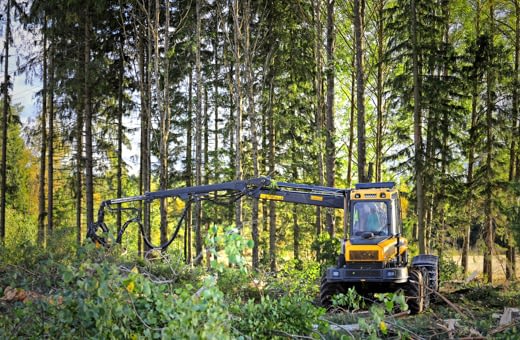Russia’s invasion of Ukraine has resulted in considerable sanctions against Russian products. This has had a significant impact on European industry, affecting a wide range of products and value chains, not to mention the forest industry and wood products.
Before Russia’s invasion of Ukraine in February 2022, about 80% of all birch plywood globally was produced in Russia, Belarus and Ukraine. Even in 2021, the export of Russian birch plywood to Europe amounted to about 1.3 million m3, with about 0.6 million m3 exported to North America.
After the fifth package of sanctions imposed on Russia by the EU finally entered into force in July 2022, the import of roundwood and wood products, including birch plywood, from Russia to the EU was banned. However, according to information and statistics obtained from the market, it seems that illegal Russian birch plywood continues to be imported to Europe from third countries.
This is reflected in increased imports of birch plywood from countries such as Kazakhstan and Turkey. Considering the production capacity of Kazakhstan, we can see that the country does not have sufficient birch plywood production to be able to deliver the volumes recorded in the statistics.
Illegal birch plywood travels to the European markets in many ways. The import ban is evaded by transit through a third country, for example. The third countries may also make minor changes to the plywood, after which the country where the changes were made is reported as the products’ country of origin. Another way is to use a false tariff heading so that the product is excluded from sanctions.
Illegal import causes unhealthy competition and weakens the effectiveness of sanctions
The illegal import of Russian birch plywood violates the sanctions imposed by the EU and the anti-dumping duty on imports of birch plywood imposed in 2021. Illegal import also violates the EU Timber Regulation and the policies of international certification bodies, at least if attempts are made to market birch plywood as a certified product.
Evading sanctions and bringing illegal birch plywood to the market causes considerable harm to the European plywood industry and other legal operators in the value chain as a cheaper, illegal product ends up in the EU market. European producers have to face unfair and illegal competition while they are already suffering from higher energy prices and the scarcity of materials resulting from the previous export ban of birch logs and veneer imposed by Russia.
The forest industry is ready to face the inevitable negative impact of the sanctions imposed against Russia as a response to Russia’s invasion of Ukraine. Our goal is to implement the sanctions, stop illegal imports and prevent unhealthy competition throughout the value chain due to the moral justification of the sanctions and to ensure their effectiveness. The Finnish Forest Industries Federation has expressed the industry’s concern to the relevant authorities in Finland and the EU and is seeking ways to prevent illegal imports and unfair trading in cooperation with authorities and stakeholders.
During the last months the circumvention of sanctions and illegal Russian pulpwood has gained a lot of interest in the international media. The Financial Times, for example, has interviewed FFIF representatives about the theme. Germany as a member state has raised the problem actively in local press and TV. Several European stakeholders have recognised the importance to fight against illegal imports of Russian plywood. Filing a formal complaint in relation to illegal imports of birch plywood from Russia is also under consideration.







